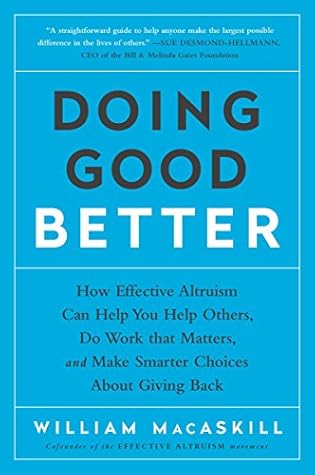More on this book
Community
Kindle Notes & Highlights
Read between
December 3 - December 7, 2019
When it comes to helping others, being unreflective often means being ineffective.
As the phrase suggests, effective altruism has two parts, and I want to be clear on what each part means. As I use the term, altruism simply means improving the lives of others. Many people believe that altruism should denote sacrifice, but if you can do good while maintaining a comfortable life for yourself, that’s a bonus, and I’m very happy to call that altruism. The second part is effectiveness, by which I mean doing the most good with whatever resources you have.
Earning to give means exactly what it sounds like: rather than trying to maximize the direct impact you have with your job, you instead try to increase your earnings so you can donate more, improving people’s lives through your giving rather than your day-to-day work.
Smoking a single cigarette gives you 0.7 micromorts, increasing your chance of dying of lung cancer many years down the line. Taking this into account, smoking one cigarette reduces life expectancy by five minutes—about the same length of time it takes to smoke it.
guesstimation.
heuristic:
Similarly, the focus on buying locally produced goods is overhyped: only 10 percent of the carbon footprint of food comes from transportation, whereas 80 percent comes from production, so what type of food you buy is much more important than whether that food is produced locally or internationally.
There’s some reason to think that the rise in ethical consumerism could even be harmful for the world, on balance. Psychologists have discovered a phenomenon that they call moral licensing, which describes how people who perform one good action often compensate by doing fewer good actions in the future.


